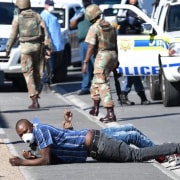|
Getting your Trinity Audio player ready...
|
NOTE TO READERS: The ACT report for 2021 is presented in a different format this year. There is no single published report – rather, this is a multimedia publication with four components.
A press release | This article | A set of infographics containing the data in visually captivating form – available in high-res also | A 27-minute podcast discussing the report with a focus on whistle-blowers
There are links to all at the bottom of the page, or you may right-click on and save the images in the gallery to the right, or listen to the embedded podcast below.







By Kwazi Dlamini
From extortion by police, to sextortion by school principals and continued Covid-19 related graft, Corruption Watch (CW) has recorded numerous complaints in 2021 from the public, displaying the extensive rot in both the public and private sectors. Meanwhile, South Africans are desperate and deprived of much-needed protection.
Our fifth instalment of the Analysis of Corruption Trends (ACT) report shows the violence with which ordinary civilians are met on a daily basis, sometimes at the hands of the very protectors of the law that is the police service. The National Disaster Act-enabled (NDA) lockdown regulations that have been in place since government began its campaign to control the spread of Covid-19, also mean that civilians encounter law enforcement officials more frequently, and the reports we receive show incidents of abuse of power, bribery and a police service that has turned against its civilians.
The recent gruesome murder of whistle-blower Babita Deokaran – a senior official in the Gauteng health department – will be engraved in our history as one of the chapters of violence used as an extreme means of possibly protecting corruption. It is instances like this, the end of a whistle-blower’s life in a hail of bullets, that remind us of the need to stop and question where our efforts as a country are failing if corruption can be so assiduously protected at the expense of innocent, yet valuable lives.
Deokaran was a witness in the Special Investigating Unit’s personal protection equipment (PPE) corruption investigation that has dogged the provincial department since 2020. Its MEC Bandile Masuku was dismissed for his failure to perform oversight duties in the procurement processes for PPE aimed at fighting Covid-19.
Shocking as it is, Deokaran’s fate is unlikely to be the last that South Africa hears of, as many commentators have opined, and although the multiple arrests associated with the case are a step in the right direction, they have not removed the deep fear with which whistle-blowers live daily, expecting similar if not the same repercussions for their bravery.
The ACT report does not represent the entire record of acts of corruption encountered by ordinary South Africans out there, but through it, Corruption Watch is able to give insight into where the hotspots are in both the public and private sectors.
Widespread Saps corruption and disdain for processes
Corruption within law enforcement is so widespread that ordinary citizens are often forced to partake in corrupt activities that they say are instigated by officials. A decision not to participate often begets a compromising, undesirable position.
In one such complaint, a reporter claims to have received a phone call from a purported member of the South African Police Services (Saps), telling him that to avoid being arrested and charged for rape, he should pay R25 000 within a week of the call. The reporter is not aware of a rape case opened against him or how the purported police officer got hold of his number, nor did he receive further communication from the caller.
Saps-related allegations continue to top the list of sectoral reports received by CW. In another alleged false accusation, a woman in Lenasia was arrested for what an official described as an incident of pointing a firearm at her neighbour. However, she claims that because the police did not follow protocols of arrest, they instead demanded a bribe to circumvent the lapse in protocol, so that she could be formally charged and appear before the court. The woman also alleges that the police refused to search her home for the firearm, as she did not own one.
Notably, cases of victimisation at the hands of the police have also not abated. In response to the alarming trends of police corruption and abuse, CW earlier this year launched the Veza Tool, an online tool that allows users to report police brutality and corruption, and teach them their rights should they encounter the police. It also provides them with necessary information on each police station in the country, such as the budget, personnel numbers, and other available resources.
Covid-19 corruption still a huge problem
Covid-19 related corruption remains the bigger issue it was a year ago, when the last ACT report was released. People mistakenly anticipated that government officials and those entrusted with state funds would prioritise citizens’ health and lives in the middle of a life-threatening pandemic. However, looting of the public purse through irregular contracts and inflated prices increased sharply and has continued, particularly in the healthcare sector. One company alleged to be owned by a relative of a provincial premier is said to have received a tender worth R200-million to supply vaccines. The company was only registered in January this year.
Furthermore, one whistle-blower alleges that a private laboratory is falsifying Covid-19 test results at a price, to enable tested individuals to travel. Another alleges a covert operation for the sale of Covid-19 test kits outside a public clinic.
The situation is not much better on the Covid-19 relief funding side. CW has received complaints of government employees continuing to receive the R350 monthly social relief grant, reintroduced earlier this year after it was discontinued in April. In addition, an alleged syndicate operating in Brits in the North West has been able to access the social relief grant from the Post Office before it reaches intended beneficiaries – allegedly with the assistance of Post Office officials.
Meanwhile, intended beneficiaries of the Temporary Employer-Employee Relief Scheme (Ters) have not been spared the harsh realities of fraud and corruption. There are further allegations of companies not paying over Ters money to employees, despite the SIU flagging several companies for similar conduct in 2020. CW’s own analysis of the Ters-related corruption was recorded in a report released earlier this year. The SIU investigations did not stop companies from fleecing employee benefits, as the reports CW received in the six-month period raise the same issues of employers claiming Ters funds on behalf of employees but do not pay them. At times, employees only pay a fraction of the Ters money to employees.
Corruption in schools and abuse of power
The ACT report also notices the trend of corruption in schools relating to procurement processes for PPE as well as donated school clothing and food.
NDA regulations have at times required schools to close as a measure to curb Covid-19 cases, and during these closures districts are required to oversee the decontamination of facilities. CW records complaints alleging the usurping of procurement powers by principals who then award contracts to companies known to them personally.
More disturbing complaints recount instances of principals operating outside the regulations of their provincial departments by hiring unqualified teachers and soliciting sexual favours from temporary teachers to safeguard their jobs.
A school principal in Johannesburg is alleged to have colluded with the school’s governing body to hire unqualified teachers. The complainant further alleges that attempts to get an educators’ regulatory body involved have failed. Another school principal of a special needs school in Gauteng is alleged to be misusing school funds and threatens educators who raise concerns, telling them that they will not get permanent placement at the school.
In other incidents reported, school principals are accused of having offered permanent employment to prospective teaching and administrative staff in exchange for sexual favours. For fear of victimisation within the sector, many of these cases go unreported.
Money for housing still encouraged
Corruption in housing is a well-documented phenomenon that CW has been vocal on for years, particularly the illegal sale or occupation of RDP houses. People who cannot afford to pay certain amounts of cash to secure such housing are cast aside and removed from the waiting list, while those who pay get advanced to the top of the list.
In Cape Town, a whistle-blower alleges that a housing department manager is selling low-income houses for R10 000 and those on the original list have been waiting for years while occupation of the houses takes place before their eyes.
The ACT report is an indication that anti-corruption bodies need to tighten the leash on corruption, as looters come in all shapes and sizes, and endanger even the most basic of human rights afforded by our Constitution.
For whistle-blowers like those who have reported cases to CW, the courage to do so is informed by their belief in a corruption-free South Africa, a country that protects them and prevents the deaths of the likes of Deokaran in the same spirit.
Press release | Set of infographics – compressed (5 MB zip) | Set of infographics – high-res (19 MB zip) | Infographics as PDF | Podcast on Spotify | Podcast on Anchor | Podcast on Apple | Podcast on Google |







